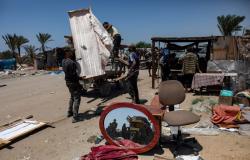Dozens of men crowd around a petite woman. She rearranges the black veil over her hair every time someone touches her head as a sign of blessing. They are her neighbors, everyone wants to approach her, congratulate her, take a photo of her, confide in her about her problem, ask for help to solve it, some bring her candy or flowers. Iqra Choudhary, 28, listens, allows herself to be photographed, and thanks her by putting her palms together, and so on for about an hour. In Kairana, a rural and depressed constituency about 120 kilometers from New Delhi, this Muslim politician has become the face of the local victory of the opposition alliance, an amalgam of more than 20 parties called India, against the Bharatiya Janata Party ( BJP), the Hindu nationalist party of Prime Minister Narendra Modi. “These elections have given confidence to many people,” says Choudhary when he manages to get away from the supporters.
It’s Thursday, barely 24 hours have passed since the end of a scrutiny that confirms that Modi, 73, will be able to form a Government, but in a minority and in need of pacts. After a decade with comfortable majorities, he has lost his aura of invincible. It is a “political and moral” defeat, said the opposition, which had been wrongly considered dead. In the rural and impoverished state of Uttar Pradesh, the most populous in India (240 million inhabitants), and the one that provides the most seats (80), Modi has suffered a deep bite. The BJP won in 2014 and 2019; This time it has lost almost half of the seats, going from 62 to 33. The most voted force has been the Samajwadi Party (SP; Socialist Party), of the opposition alliance. This is the group of Iqra Choudhary, who has taken the seat from the BJP candidate, so she will become, in her first attempt, a parliamentarian in the Lok Sabha (the lower House, in charge of investing the prime minister).
Voters have given their support to a message of “cohesion” in the face of Modi’s “divisive politics,” says Choudhary, who comes from a family linked to politics. The BJP, he points out, has tried to “confront Hindus and Muslims” and “inoculate the fear” that people of Islamic faith, a minority of 200 million (14%) in India, “will take away their jobs and wealth.” ”. The constituency is located near an area hit by communal violence, and hit the headlines for an alleged exodus of harassed Hindus, which she considers “uncertain”.
In Kairana, where almost a third of the 1.7 million voters are Muslim, according to The New Indian Expressany victory also requires the support of Hindus and people of all castes, including the lowest (15%, according to the newspaper Lokmat). “India is a diverse land. Many communities have voted for us, that is why we have won the seat,” Choudhary defends. The BJP’s division strategy sought to “divert attention from the underlying problems,” he says. Perhaps the main one: “There are no jobs for the young people of this country.”
Youth unemployment, above 45%
Join EL PAÍS to follow all the news and read without limits.
Subscribe
With youth unemployment above 45% and inflation of a staple food like rice at 14% year-on-year, these elections have largely been played on the ground of lack of prospects. In Kairana you don’t have to scratch hard to find the open wounds of inequality. On the other side of the highway that circles the city, where the crops begin, sits Siraj Sidique, 32, next to three immense bales the size of a trolleybus; They contain leaves from the rice plant—used as food for animals—and dried chips, which they use as fuel. He is muslim. He voted for BJP in 2014 and 2019. This time he has opted for Choudhary. “In five years we have not even seen the BJP MP,” he protests. “There is unemployment, inflation. “People want change.”
Behind the bales, Mohamed Jamshed, 72, also a Muslim, clears some pumpkin seedlings of weeds with his grandchildren. “We all voted for Iqra,” he says. “We don’t want the BJP to rule anymore, he has done nothing for us. Nobody has a job here.” From there begins a dirt road that goes towards the fields, where Sarvez, 35 years old, comes on a motorcycle, loaded with a package of fodder for his two buffaloes. “Everyone is here saddened with their problems, there is no solution,” says this man with three children.
Behind him, the chimney of a kiln dedicated to firing bricks points to the sky. They are seen throughout the region, smoking like incense sticks stuck in the ground. There is Sohail, a 19-year-old day laborer, with his face covered in orange dust. He earns 300 rupees a day, about 3.3 euros, the same as his father and mother, who say they are 60 years old, have worked there since their youth, and are squatting in front of him, taking a breath, while they watch the boy work. . Perched on a brick wall, Sohail takes from under his feet these primary elements of the construction, freshly cooked in the heat of cow dung, and throws them two by two into the pile below, so that another laborer like him can pick them up.
The bustle is incessant, a coming and going of carts and carts, pack animals, and dust-covered workers. When Sohail’s family is asked about the vote, her mother replies: “What does one matter more than the other, nothing ever changes us.” They acknowledge that in the past they chose the BJP, but this time the SP. Sohail, who was making his debut in the polls, has also opted for Choudhary. They are people who cannot even pay for electricity because it would mean giving up food; A woman says that she does not send her son to school because she cannot afford the fees. Another of the day laborers, a dalit (the caste of untouchables), lights a cigarette and says that he also voted for the SP candidate: “She is one of us, a local; those from the BJP are foreigners.”
In one of the neighborhoods of the district where these live untouchables, mostly Hindus, almost all those interviewed claim to have voted for the BJP. Pramod Parasa, 52, recognizes the reasons for the defeat: there is inflation and unemployment, the BJP candidate has hardly been seen and those who have voted for this party have done so for Modi. However, also in this fiefdom of the party in power, there are people like Vipin Kumar, a 34-year-old vegetable seller, a former voter of this party, who explains why he has opted this time for the young Muslim politician: “To put pressure on to the BJP, so that it rectifies, and, the next time it promises something, it fulfills it.” He mentions the proposals on employment and the deposit of Rs 150,000 into each Indian’s account as unfulfilled promises.
“In places like Uttar Pradesh it is clear that the youth, the poor and the dalit “They have voted against the BJP,” emphasizes Professor Apoorvanand, a common voice among critics of the Government. He considers that the electoral result “is a mandate against inequality”, a “sound message of rejection of the idea of hegemonism”, and “of restoration of balance in democracy”. Perhaps the clearest symbol is the defeat of the BJP in Ayodhya, where Modi inaugurated the Hindu Ram temple in January: his party lost the seat there to a candidate from the caste. dalit.
Various analysts highlight one of the opposition’s strategies. Rahul Gandhi, leader of the opposition Congress Party, has spent the campaign with a book of the Constitution that he showed at each rally to accuse the Government of seeking to modify the constitutional reservations established to positively discriminate against the most disadvantaged social strata. .
Apoorvanand adds that Modi should take responsibility as he turned the election into a “referendum” on his rule. He has sewn up the country by giving rallies and his figure stood out over the candidates in each constituency. The opposition, on the other hand, has played the cards of local politics. Choudhary, for example, opted for door-to-door contact, and did not want there to be large events in his area by the first swords of the opposition alliance, led by Gandhi’s Congress Party.
Kairana’s young politician does not sell a self-made woman’s story. She has attracted part of the vote of those who have less, but she belongs to a well-known upper-caste landowner family: her grandfather, her father and her mother have been part of the Lok Sabha before her. ; Her brother, an MP in the Uttar Pradesh Parliament, has recently spent a year in provisional detention accused of various crimes — “random cases that the Government [regional] “I imposed it on him just so that he would stay away from the electoral process,” the sister defends.
Little space for women
She studied in private schools, studied Law at university, completed a postgraduate degree in International Politics in London; She speaks excellent English and masters the electoral mechanics of the 21st century around the globe. She speaks easily of the rise of “hate speech” and fear-based nationalist populism that has spread around the world, including India.
“I am very grateful for the privilege. It is for this reason that I have managed to achieve this position,” she acknowledges. “What I can do, for my part, is be honest and not take everything for granted.” One of her objectives will be to give a voice to women, cornered in national politics. Only 73 parliamentarians have been elected in the elections, five less than in 2019; half the population is thus relegated to 13% of the Lok Sabha. That is why the image of the commotion of men trying to give him their blessing is striking; Her peers have not come, although she knows that many have voted for her. “It is very difficult for a woman to enter politics here.” She wants that to change. “They have enabled me, now it is my turn to open spaces so that they can also get ahead.”
Follow all the international information on Facebook and xor in our weekly newsletter.
Subscribe to continue reading
Read without limits
_







